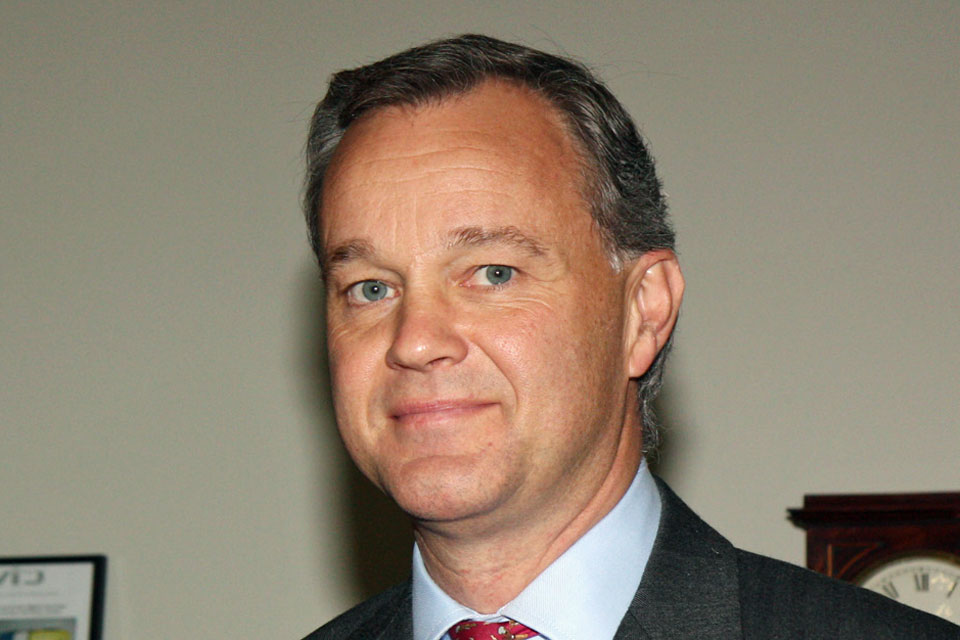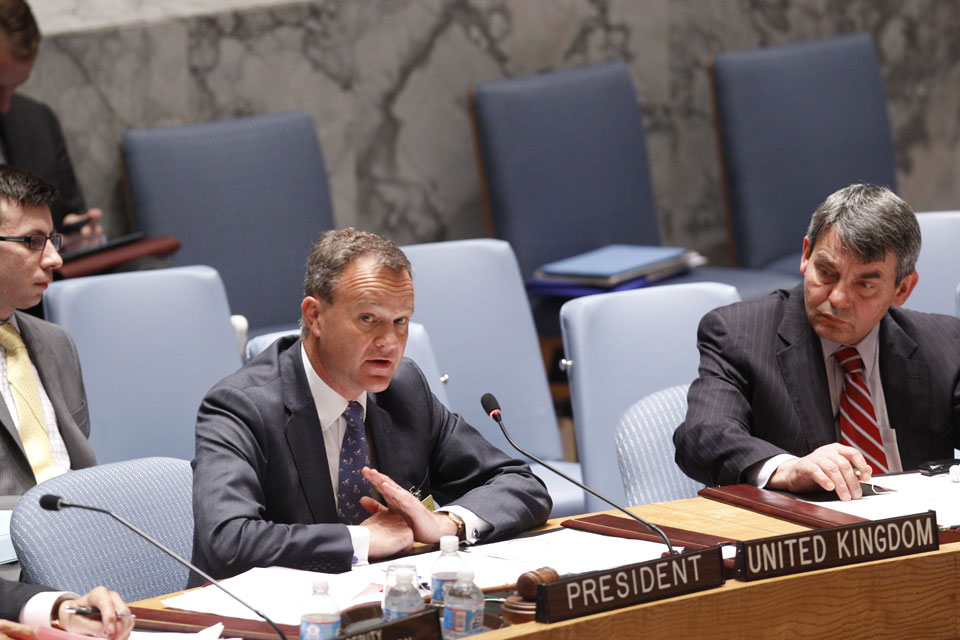"The UK will stand with the Somali people and their government"
Foreign Office Minister for Africa, Mark Simmonds, chairs UN Security Council briefing on Somalia.

In New York today FCO Minister for Africa, Mark Simmonds, chaired a UN Security Briefing on Somalia. The meeting, called by the UK during its June Presidency of the Council followed the Somalia Conference in London on 7 May which was co-hosted by the UK and Somalia. The Conference brought together 55 countries and international organisations in support of the Somali Government’s priorities: armed forces, policing, rebuilding the judiciary, public financial management and political reconciliation, with visible Somali ownership.
The Security Council set out its support for the Federal Government and the outcome of the Somalia Conference in London which saw almost $350m in new financial support pledged behind the Federal Government’s plans, including $55m from the UK. The Somali Deputy Prime Minister also travelled to New York to participate in the Security Council briefing. This meeting comes just days after the 3 June launch of the new UN Mission for Somalia (UNSOM), headed by UN Special Representative Nick Kay, which will play a key role in making the UN’s efforts more coordinated.

Security Council Meeting: The situation in Somalia Report of the Secretary-General on Somalia
Intervention by UK Minister for Africa, Mr Mark Simmonds, to the Security Council briefing on Somalia – 6 June 2013 – checked against delivery
Mr Deputy Secretary-General, Members of the Security Council, Madame Deputy Prime Minister, it is an honour for me to be chairing this meeting of the Security Council on Somalia. I am grateful to the Deputy Secretary-General for his insightful briefing.
Following the Somalia Conference on 7 May 2013, the UK has chosen to make the situation in Somalia a high priority for the UK Presidency of the Security Council this month. The Conference was distinguished by the close working partnership between Somalia and the UK. I am therefore delighted that the Deputy Prime Minister has joined our meeting today and commend her tireless efforts since taking office to promote peace and stability in Somalia.
Somalia has been through a dramatic shift over the last twelve months. A new parliament and government have been appointed in the most representative political process in a generation. Somalia has a provisional constitution. The economy is recovering. And the diaspora are returning. Above all there is a sense of hope. Somalis are determining their own future.
Last month in London we saw a united international community ready to support the next phase of recovery: Somali-owned and Somali-led.
Somali Ministers shared detailed plans for developing the country’s armed forces, police, justice sector and public financial management systems. The international community endorsed those plans and committed expertise and funding to deliver them.
The Security Council can be proud of its recent role in Somalia. From ensuring that AMISOM has the resources and mandate to succeed, to guiding the UN towards its deepest level of engagement in Somalia for over two decades. The Council has stood beside and behind the Somali people. We have a collective responsibility to ensure that this continues.
I am delighted that UNSOM deployed on 3 June. The Mission will play a key role in making the UN’s efforts more coordinated and coherent and providing the Somalis with one door to knock on.
Of course none of this progress would have been possible without the enormous contribution of the African Union, and AMISOM in particular. And I pay tribute to the bravery and sacrifices of all AMISOM, Ethiopian and Somali personnel. History will show the magnitude and importance of their contribution and efforts in bringing peace to Somalia.
We look to both the UN and African Union to work in a complementary manner, for the good of the Somali people. We are encouraged by the forthcoming joint UN/AU review of AMISOM’s progress. The development of AMISOM’s Concept of Operations in January 2012 was an example of the strong cooperation between both organisations. And the results on the ground speak for themselves. We will support this work in any way we can.
It is in the interests of Somalia, the region and the wider international community that momentum is maintained. But we cannot be complacent. History has shown that if Somalia is allowed to backslide into instability and conflict, the consequences will be felt well outside its borders in the form of regional instability, piracy and terrorism.
For all the progress that we have seen, Somalia continues to face huge challenges. We should be under no illusions as to the sustained efforts that will be required, in Somalia and from its international partners, to ensure progress continues. Somalia lacks public services – schools, hospitals, clean water supplies. More than 70% of Somalis still live on less than $2 a day. There is very real suffering on a daily basis. And we cannot stand by and risk another famine like the 2011 crisis when more than quarter of a million people are confirmed to have died.
Al-Shabaab is under real pressure but as recent attacks have shown, they still remain determined to kill innocent civilians and halt Somalia’s progress towards peace and prosperity.
The international community must work to continue in partnership with the Somali Government to address these challenges.
That means supporting President Hassan Sheikh’s six point plan through ensuring the commitments made at the Somalia Conference are fully realised and aligned in support with Somali priorities.
It means ensuring the right blend of international support to Somalia. It is imperative that AMISOM and the UN, especially through UNSOM, and bilateral partners work closely together in a coordinated manner.
It means ensuring AMISOM has the appropriate tools to carry out its mandate. And developing effective, legitimate and affordable national security forces, with clear accountability and oversight, which will be essential for the Somali Government to fulfil its role of protecting people and property and preserving public order. International partners should work together to ensure that our support to the development of Somalia’s security forces is co-ordinated and aligned to the Federal Government’s plans.
It means addressing serious human rights concerns. Somalia remains one of the worst places in the world to be a woman. I welcome the Government of Somalia’s commitment to improving human rights, tackling sexual and gender-based violence, and protecting both women and children from the effects of conflict. They will have all of our support as they tackle these vital issues.
And ultimately, political progress will remain the key to long term stability in Somalia. I welcome the Somali Government’s commitment to hold democratic elections in 2016. To achieve this, much needs to be done to resolve outstanding constitutional issues and the relationship between the Federal Government and the regions.
I welcome the recent dialogue between the Government of Somalia and the regions and hope this continues. I commend the role played by IGAD and Somalia’s neighbours.
We were pleased to host the talks between Somalia and Somaliland in Chevening in June last year, and welcome the continuation of the dialogue in Turkey. It is only through dialogue that lasting solutions can be developed.
I welcome the European Union’s plan to hold a conference on Somalia in September. The conference will help sustain the momentum and build a new and long term partnership between Somalia and the international community on political reconstruction and economic development.
In conclusion, distinguished Members of the Council, Madame Deputy Prime Minister, Deputy Secretary-General, Somalia has come a long way since the days of extremism and tyranny brought nothing but misery to the long suffering Somali people. The next twelve months will be pivotal for Somalia: we must support the Federal Government to ensure the plans agreed in London are implemented swiftly to realise improvements in security, policing, justice and public financial management; we must ensure ordinary Somalis across the country see changes on the ground; and we must improve coordination between the international community.
Along with this Council, the UK will stand shoulder to shoulder with the Somali people and their government as they continue their journey towards a brighter tomorrow.
Thank you.
Further information
Follow Foreign Office Minister Mark Simmonds on twitter @MarkJSimmonds
Follow the UK Mission to the UN (New York) on twitter @UKUN_NewYork
Follow the Foreign Office on twitter @foreignoffice
Updates to this page
-
Added intro text to article.
-
First published.